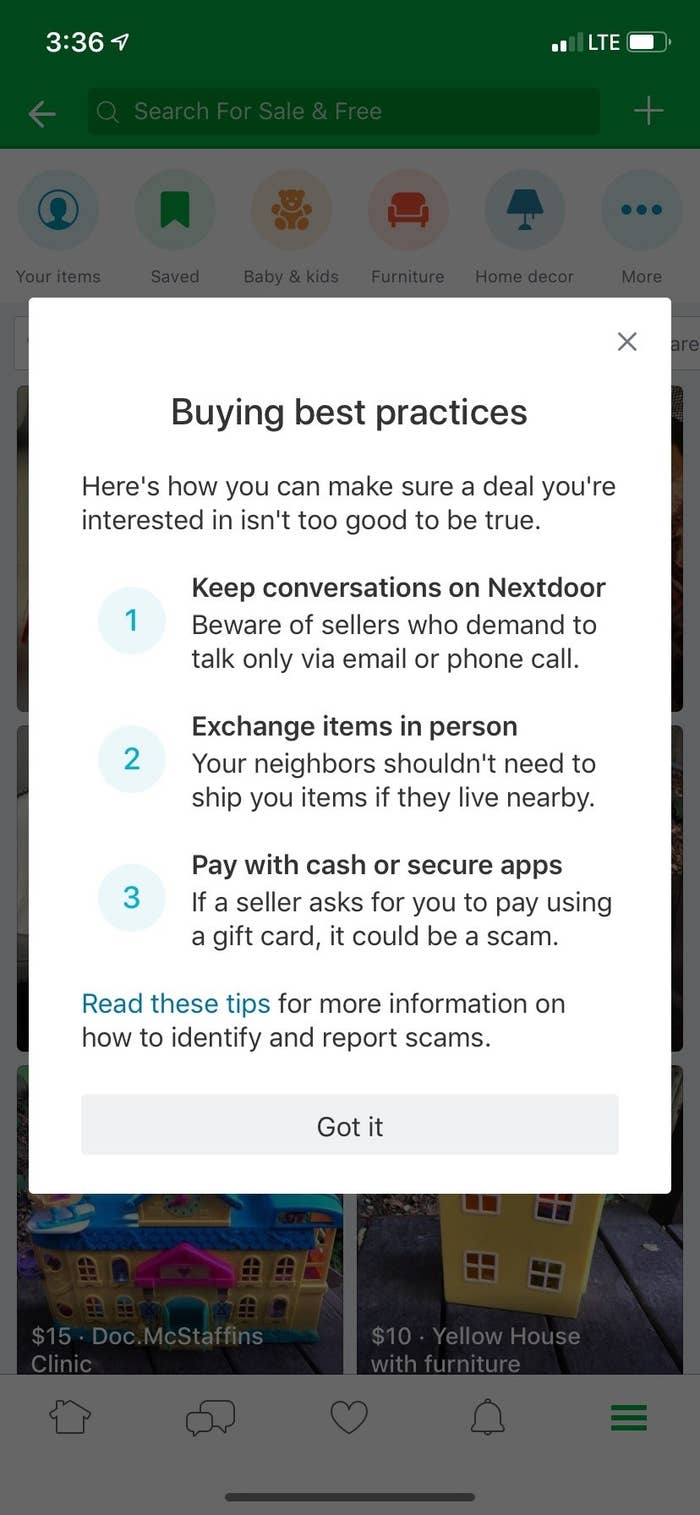
This story is part of Protect Your Parents From the Internet Week.
Nextdoor is a platform for neighbors to chitchat about everything from lost keys found at the local park to a sassy Bengal cat terrorizing the cul-de-sac’s pets. But it’s also a hotbed for scammers, like a “contractor” who disappeared after the deposit was paid, an imposter who hired teenage assistants and botched a remodeling project, and a woman who stole a real nanny’s identity to dupe multiple families.
“There’s a false sense of security on Nextdoor that, because these are people in your immediate community, they must be trustworthy. Because of that, people may be less likely to use due diligence in researching contractors and caregivers,” said Brandy Bauer, an associate director at the National Council on Aging.
In Westminster, Colorado, 72-year-old Pam Ruffin was looking to repair her fence and contacted a company named Eagle Eye Fence, which multiple users on Nextdoor recommended, according to a report by ABC 7. Two contractors visited Ruffin and offered to fix her fence in exchange for a check for $11,800 to pay for supplies. She never saw them again.
A family in Texas also looked to Nextdoor for a contractor, only to have the remodel of their kitchen backsplash botched when he hired four inexperienced teenagers for the job, reported KBTX. After the station contacted the contractor — who never returned to the house to check the work after realizing the wrong type of grout was used — he refunded the family.
A Better Business Bureau study in 2018 found that people were more susceptible to losing money due to a home improvement scam compared to other types of scams, and especially if they were between the ages of 35 and 54. A search for the keyword “Nextdoor” on the BBB’s scam tracker shows that five households have reported a total of $16,600 lost to home improvement cons since 2016.
According to Bauer, this type of scam isn’t unique to Nextdoor: “The scammers [on Nextdoor] are simply using a 21st-century version of an old, effective tactic.” Bauer explained that fraudsters are known to drive around neighborhoods looking for properties in need of repairs and offer homeowners affordable quotes for proposed work, then ask for payment up front. The “contractors” would perform a minimal, shoddy job, or none at all. “We know older adults in particular were raised to be neighborly and trusting,” she explained.
While the scam isn’t new, the platform is. Nextdoor saves scammers time by revealing exactly who needs construction work — and where they live. Nextdoor shares its users’ full names and addresses with other people in the neighborhood by default. (You can choose to display just your street name by clicking on your profile picture and going to Settings > Privacy.)
Nextdoor spokesperson Jenny Mayfield told BuzzFeed News that “this is an issue that affects all online platforms, and we encourage our members to take this matter seriously and to continue to be vigilant online at all times.” Mayfield noted that because Nextdoor requires people to sign up with their real name and verify their address before becoming members of their neighborhood, the platform has an “extra layer of security, as compared to other platforms.” The company sends a postcard with a verification code to the user’s purported address or cross references the user’s information with LexisNexis and phone bill records.
Neighbors also frequently post endorsements for current or former nannies or cleaners — another chance for scammers to take advantage of unsuspecting users. In May, Oakland police arrested Marianna Monticalvo for using a nanny’s personal information from Nextdoor to steal the nanny’s identity to dupe multiple families. On the site, Monticalvo convinced the nanny to share personal information, teaching credentials, and other documents with her by posing as a mother looking to hire a caretaker. Oakland police arrested Monticalvo for felony identity theft and misdemeanor cruelty to child by inflicting injury. One victim, speaking with ABC 7, said she hired Monticalvo after seeing a post on the platform claiming to have been written by the woman’s previous employer. It wasn’t.
The platform doesn’t just host person-for-hire scams. The Fishers Police Department in Indiana was forced to warn residents of a car sale scam on Nextdoor. The same scheme has reached other places, including Moses Lake, Washington, where a man saw a Nextdoor posting for a vehicle on sale on the online auction site eBay and provided the seller with eBay gift cards. The deal was fake. One Madison County, Alabama, couple put a notice for their lost cat on Nextdoor, as well as on Craigslist and in Facebook groups. They received a text from a stranger who claimed to have found their cat and asked the couple to send reward money via an app link. When the stranger refused to send a picture of the 3-year-old Siamese, the couple grew suspicious and decided to warn other pet owners.

Perhaps it’s Nextdoor’s verification — and the intimacy of connecting with genuine neighbors who share concerns about that one house that leaves their trash bins out for too long, or repeat porch package thieves caught on hidden doorbell cameras — that gives Nextdoor users, especially ones not particularly attuned to the ways internet scammers work, a false sense of security and trustworthiness. According to the FBI, seniors are more attractive to con artists because they are “most likely to have a ‘nest egg,’ to own their home, and/or to have excellent credit.”
In other words, the parents who once warned us of the dangers that lurked online — cyberbullies, porn, hackers — are the very ones most likely to fall for these kinds of scams.
Nextdoor, a community of renters and homeowners in 237,000 neighborhoods across 10 countries, doesn’t publish member numbers, but in 2017, former CEO Nirav Tolia told Adweek that the site has “tens of millions of regular users.” According to Quantcast, an estimated 4.1 million people visit the site every month. The specific demographics of Nextdoor’s members are also unknown, but anecdotally, looking at the neighborhood where I live in San Francisco, most posts are written by concerned property and pet owners, and the occasional college student looking for odd jobs. A small study of 13 Nextdoor users by the Georgia Institute of Technology found that to be true: The users were mostly married couples between 36 and 50 years old who owned their homes.
Mayfield said that Nextdoor relies on “neighborhood leads” — community members granted additional capabilities, like verifying unverified members — to flag content, in addition to automated scam detection. The platform has also published guides on how Nextdoor users can avoid being defrauded and has warned its community about the gift card scam. The website added a new in-app pop-up with tips on how to ensure purchases on the platform are legitimate.
The best way to protect your parents — and yourself — from Nextdoor scams is to do research off the platform before hiring or buying. Bauer recommends checking that contractors and caregivers meet state and local licensing requirements and getting contracts in writing. “Don’t automatically trust referrals provided in a post, and don’t feel pressured to commit to engaging services under a tight deadline,” she said. Checking the Better Business Bureau to see whether a local business has any outstanding issues can also help.
Ask for references, look for reviews on third-party sites, and never, ever pay for anything you haven’t seen yourself or received. If you’re arranging to purchase a product, meet the seller in a public space. The SafeTrade Stations website lists local police stations that provide designated, surveilled areas for transactions to occur.
Fraud or scam attempts should be reported to your local police department and to Nextdoor (to the right of the author’s name, click “Report post” or “Report comment”). Consider submitting a complaint with the FBI’s Internet Crime Complaint Center and the Federal Trade Commission.
“The bottom line is that one scam is too many,” said Mayfield. ●
